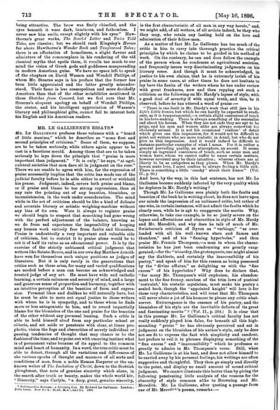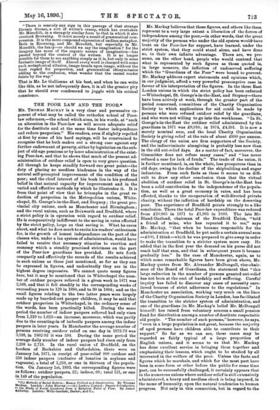MR. LE GALLIENNE'S ESSAYS.*
Ma. La GALLIENNE prefaces these volumes with a "hoard of little maxims," which he describes as " some first and second principles of criticism." Some of them, we suppose, are to be taken seriously, while others again appear to be cast in a facetious mould. Among those that are to be taken seriously he lays down the principle that "praise is more important than judgment." "It is only," he says, "at agri- cultural societies that men dare sit in judgment on the rose." There we are unable to agree with him, for the expression of praise necessarily implies that the critic has made use of the judicial faculty before he is able either to award or withhold his praise. Judgment, indeed, covers both praise and blame, or if praise and blame be too strong expressions, then at any rate the pointing out of any beauties, blemishes, or inconsistencies, in the work under consideration. The mind while in the act of criticism should be like a kind of delicate and accurate literary or artistic weighing-machine without any bias of its own. Were it always to register praise we should begin to suspect that something had gone wrong with the perfect adjustment of the balance, knowing as we do from sad experience the impossibility of keeping any human work entirely free from faults and blemishes. Praise is undoubtedly a very important and valuable side of criticism, but to restrict it to praise alone would be to rob it of half its value as an educational power. It is by the exercise of the strictly unbiassed critical judgment that writers like Sainte-Beuve, and in our own day Matthew Arnold, have won for themselves such unique positions as judges of literature. But it is only rarely in the generations that critics such as these arise, for many and varied qualifications are needed before a man can become an acknowledged and trusted judge of any art. He must have wide and catholic learning, a certain calmness and serenity of mind, and a large and generous sense of proportion and harmony, together with an intuitive perception of the beauties of form and expres- sion. Personal likes and dislikes he will naturally have, but he must be able to mete out equal justice to those writers with whom he is in sympathy, and to those whom he finds more or less antagonistic to him, and to award impartially blame for the blemishes of the one and praise for the beauties of the other without any personal leaning. Such a critic is able to hold himself aloof from any particular school or .coterie, and set aside or penetrate with clear, at times pro- phetic, vision the fogs and obscurities of merely individual or passing tendencies of thought that may chance to be the fashion of the time, and to point out with unerring instinct what is of permanent value because of its appeal to the common mind and heart of humanity. Ina word, the true critic must be able to detect, through all the variations and differences of the various epochs of thought and manners of all sorts and conditions of men, from a noble Roman Emperor or the un- known writer of The Imitation of Christ, down to the Scottish ploughman, that note of genuine sincerity which alone, in the search after truth or beauty, makes the whole world kir. " Sincerity," says Carlyle, " a deep, great, genuine sincerity, • Retrospectire R.viewa : a Literary Log. By Rinbard Le Galilean°. John Lane. New Yo•k Dodd. Eta ', and Co. 1896.
is the first characteristic of all men in any way heroic," and, we might add, of all writers, of all artists indeed, be they who they may, who retain any lasting hold on the love and admiration of their fellow-men.
As a matter of fact Mr. Le Gallienne has too much of the critic in him to carry into thorough practice the critical principles by which he claims to be guided in his method of work. On the contrary, he can and does follow the example
of the person whom he condemns at agricultural societies, and frequently issues very discriminating judgments on his literary roses. And though it must be acknowledged, in justice to his own claims, that he is extremely lavish of his praise in some cases, at other times he does not hesitate to lay bare the faults of the writers whom he has under review with great frankness, now and then rapping out such a criticism as the following on Mr. Hardy's lapses of style, with a good deal of severity if with equal truth, and this, be it observed, before be has uttered a word of praise :-
" There is one fault in Mr. Hardy's work that still jars in his Life's Little Ironies, but which he can hardly be expected to eradi- cate, as it is temperamental,—a certain slight coarseness of touch in his love-making. There is always something of the sensualist cad about his heroes. When they are not cads they are apt to be prigs, and his men and women alike are always somewhat tco obviously animal. It is not his occasional ` realism' of detail which gives one this impression, for it would not be difficult to point out writers who are more realistic in detail, but who do not give us this impression. And it would indeed be difficult to instance particular examples of what I mean. For it is rather a general pervading quality, an atmosphere, an accent. It seems simply an ingrained coarseness of touch, such as some men and women have, whom we cannot suffer to name certain matters, however reverent may be their intention ; whereas others are at liberty to be as outspoken as they please. When Mr. Hardy's heroes make love, I must confess to always feeling a little sick. There is something a little reechy ' about their kisses." (Vol. II., p. 80.) And here, by the way, in this last sentence, has not Mr. Le
Gallienne become suddenly infected by the very quality which he deplores in Mr. Hardy's writing ?
Though Mr. Le Gallienne sees plainly both the faults and beauties of the book he is writing about, he does not leave upon our minds the impression of an unbiassed critic, but rather of one who, in certain instances, will not admit the faults which he clearly sees, while he is apt to exaggerate the merits. Why, otherwise, to take one example, is he so justly severe on the lapses and affectations and obscurities in style of Mr. Hardy and Mr. Meredith, and why does he talk of much of Mr. Swinburne's criticism of Byron as " verbiage," "as over- loaded with all his well - known stars and flames and thunders," and of his " flaming hyperboles," and then praise Mr. Francis Thompson,—a man in whom the charac-
teristics he has just been condemning are greatly exag- gerated,—for the "wizardry, the grotesquerie, one might almost
say the diablerie, and certainly the inaccessibility of his poetry," and speak of him for this reason as being possessed by the "divine afflatus," as delighting us with the "fine excess" of his hyperboles P Why does he declare that, "for many Mr. Thompson's wild euphuism, his abandon- ment to the fine frenzy, careless of the trim laws of poetical
• restraint,' his ecstatic mysticism, must make his poetry a sealed book, though the appointed knight' will love it for these very characteristics, and will trust that Mr. Thompson will never abate a jot of his humour to please any critic what- soever. Extravagance is the essence of his poetry, and the blemishes of his style are the inevitable defects of its great and fascinating merits " ? (Vol. II., p. 264.) It is clear that
in this passage Mr. Le Gallienne's critical faculty has not really suddenly played him false, for beneath all this high- sounding " praise " be has obviously perceived and sat in judgment on the blemishes of his author's style, only he does not see fit to express the fact with simplicity and candour, but prefers to veil it in phrases displaying something of the
" fine excess " and " inaccessibility " which he professes so greatly to admire in Mr. Thompson's verse. Still, when
Mr. Le Gallienne is at his beat, and does not allow himself to be carried away by his personal feelings, his writings are often suggestive and thoughtful. They then go simply and directly to the point, and display no small amount of sound critical judgment. We cannot illustrate this better than by giving the following penetrating little analysis of the reasons for the obscurity of style common alike to Browning and Mr.
one of Mr. Mered;tb's poems, remarks :—
London: Meredith. Mr. Le Gallienne, after quoting a passage from "There is scarcely any sign in this passage of that strange literary disease, a sort of writer's cramp, which has overtaken Mr. Meredith, in a strangely similar form to that in which it also overtook Browning. It is not merely a result of grammatical com- pression. It is the more compound expression of endless metaphor. Both in Browning, and Mr. Meredith, but especially in Mr. Meredith, the fancy—or should we say the imagination ? for the imagery has more of the organic nature of imagination—has passed beyond the control of the writers. It is no longer possible for them to see anything simply as it is, but only in some fantastic image of itself. Almost every word is charged with some such metaphorical allusion, image treads upon image, without the least regard for proportion, and grammatical idiosyncrasies adding to the confusion, what wonder that the casual reader faints by the way."
That is Mr. Le Gallienne at his best, and when he can write like this, as he not infrequently does, it is all the greater pity that he should ever condescend to joggle with his critical conscience.







































 Previous page
Previous page